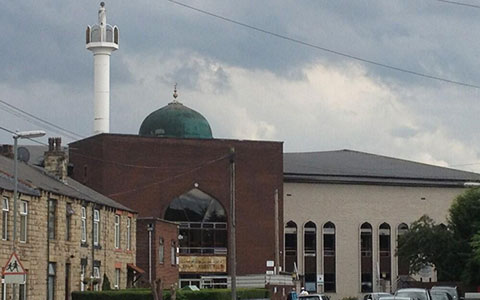What now for Tablighi Jamaat after death of leader?
by - 19th February 2016

Hafiz Mohammad Patel, the Amir of Tablighi Jamaat in Britain and the man tasked to win the UK for Islam has died at the age of 92. Here Dr Zacharias Pieri examines the implications.
AN immigrant to the UK in the early 1960s, Hafiz Mohammad Patel, quickly established himself as a leader in the activities of Tablighi Jamaat (TJ), a global Islamist missionary movement established in India in 1926, and which seeks to re-educate Muslims to a more literal understanding of Islam.
TJ is the movement behind attempts to construct Europe’s largest mosque in East London, dubbed as the London “Mega Mosque”. Central to the movement is a belief in actively spreading Islam to others, and in this regard Patel exerted much time and energy. Older Tablighis recall Patel walking through snow in Dewsbury wearing green wellies, going from door to door to preach TJ’s version of Islam. Others remember him trekking almost 10 miles from Dewsbury to Bradford on a daily basis to spread TJ’s message and methods. He was appointed Amir of TJ in Britain, a position which he held until his death, and is credited for overseeing a vast expansion of the movement in the UK and Europe.
Patel as a man described himself as an “ordinary worker”, and had a life long passion for cricket. But Patel was also imbued with a mystical aura – viewed by many of his followers as a living saint. Patel’s biography connects with those of the founders of TJ with whom he nurtured close contacts, encouraging frequent exchanges between different international branches of the movement. Patel originally came into contact with Maulana Mohammad Yusuf, TJ’s global leader at the time, and son of TJ founder Mohammad Ilyas while on pilgrimage in Mecca. Yusuf is said to have been so impressed by Patel’s sincerity in the cause of Islam that he took him in front of Islam’s holiest shrine – the Ka’bah – and there offered supplications to Allah to make him “the instrument of winning the whole of Britain to Islam.”
Patel’s contribution to seeing the establishment of Islamic institutions in Britain is reflected in a comment by one of his followers: “60 years ago we had nothing here in terms of establishment Islam, it is through his struggle and his sacrifices that the masjid, maktib, and madaris exist today”. In 1978 Patel oversaw the construction of TJ’s European headquarters in the Saviltown area of Dewsbury, and in 1985 the construction of TJ’s school and seminary. TJ’s headquarter mosque was inaugurated by TJ’s chief ideologue Mohammad Zakariyya in 1979, who according to Yogindar Sikand, “prayed fro its success as a centre of Tablighi activity in the west.”
Patel’s passing will spark an intense period of mourning among Tablighi communities not only in Britain, but also across the world. There will however also be cause for celebration. After all TJ is a salvation oriented movement dedicated to ensuring its members achieve an eternity in paradise. Tablighi’s regard life here on earth as temporary and that “what we do in this life directly impacts whether we spend an eternity in heaven or hell”. The purpose of our earthly life, according to TJ sayings is “to prepare our heavenly abode, to turn our eyes away from the filth of this world, and to strive in attaining Allah’s blessings”. For Tablighi’s Patel’s life was a lived example of this, and will be promoted as a model for others.
Patel’s passing will have deep implications on TJ in Britain. As Sikand notes, TJ has attempted to create segregated societies in which Tablighi Muslims can live separate from the mainstream of British society: “The Tablighi ethos works to minimize contact with people of other faiths, withdrawing from the wider society to protect Islam from the threat of secularism and materialism”. Yet, some younger members have experimented with engaging with the wider society. This was to demonstrate that TJ was a movement that had adapted to the British context, and as a means to allow the construction of TJ’s so called “Mega Mosque” in London. Ultimately TJ failed to convince planning authorities that it was committed to developing a mosque site that would be of benefit to a multicultural society. Ken Clark, a council cabinet minister, said: “Newham council has tried to work with the trust for more than a decade now to create a plan that would benefit all residents…But repeatedly [TJ] has broken its promises and delayed the inevitable. It is now time that this site is made thoroughly safe and developed appropriately so that it can provide vital facilities for the whole community.”
In essence, TJ remains a secretive and conservative movement that will have planned a clear line of succession, ensuring that TJ core principles and ideologies are maintained. The selection of any TJ leader at the national level is made in close cooperation with TJ’s international council based in India. It is unlikely that TJ in Britain will alter its direction, or deviate from the path of seeking to create spaces of purity in which their members can live their lives untainted by the secular and liberal values of wider society. The new leader of TJ in the UK will seek to build on Patel’s legacy and continue the work of “winning the whole of Britain to Islam.”
Dr. Zacharias Pieri is a Research Fellow with the Global Initiative on Civil Society and Conflict at the University of South Florida. He is a leading expert on Tablighi Jamaat in Britian. He is author of Tablighi Jamaat and the Quest for the London Mega Mosque published by Palgrave in 2015, and Lapido Media’s Handy Book on Tablighi Jamaat in Britain.
